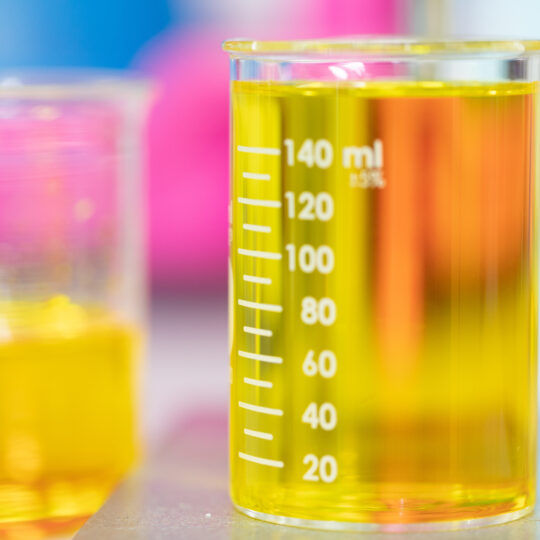Pretreatment Technology Changes Across the Biodiesel and Renewable Diesel Industry
Filtration treatments adapt to remove new and agressive contaminant

When it comes to oil filtration, biodiesel is the least challenging to refine, followed by edible oils, and then renewable diesel that requires the most processing. There are strict specifications to follow because solids can clog and stop the flow of fuel to the engine. Phosphorous and soaps are two main impurities targeted for removal from these oils. These impurities are created during the process of neutralizing free fatty acids. Engineers and pretreatment technology companies are adding another impurity to their filtration list: polyethylene. Today, we’re taking a look at why polyethylene is a problem for renewable diesel, technology changes made to address the impurity, and how diatomaceous earth plays a role.
Changes to Pretreatment of Biodiesel and Renewable Diesel
BioEnergy International’s Changes
Featured in the 2020 spring edition of Biodiesel Magazine, BioEnergy International is a full-range supplier of innovative GreenTech solutions with the goal of bringing value to waste streams. The company has been working in the biodiesel and renewable diesel field for over two decades and has more than 70 projects all over the world, which puts them at the forefront for recognizing issues with a newer impurity: polyethylene. This contaminant is on the rise in various forms of feedstocks because of packaging, ear tags, and plastic bags (often used to separate parts of animals).
Engineers and pretreatment technology companies are making changes to their pretreatment processes to remove this impurity. BDI’s patented pretreatment system is now offered to customers. The approach involves a pre-unit that accumulates polyethylene using heat and mineral filter aids. The polyethylene particles attach to the filter media, and a centrifuge and tricanter remove the solid particles.
There are many ways to filter renewable oils, and BDI uses several combinations of processing steps in pretreatment, including washing extractions, separation techniques, solids removal, filtration, adsorption, and bleaching. This wide range of pretreatment options allows them to customize the process according to customer requirements.
Crown’s Pretreatment Process
Crown Iron Works is a global supplier of oilseed extraction technology, refining plants, and equipment. It provides renewable diesel pretreatment equipment and equipment for biodiesel filtration.
Crown Iron Works has observed that for many renewable oil companies, appearance and flavor are not important as it is for filtering products like edible oils. Companies want the phospholipids out without the worry about how color and flavor are impacted. That’s because renewable diesel has to have less than 1 ppm of a number of contaminants.
Crown’s system uses four stages to remove impurities. During the first stage, it takes out larger impurities including polyethylene. This differs from other filtration methods that sometimes take those impurities out at the end during bleaching. However, bleaching clay can expensive for removing solids, driving up the cost of filtration. Plus, there are concerns about stack gases, flare off, and wastewater when disposing of bleaching clay.
By taking out these impurities early, Crown can leverage other filtration medias during bleaching: silica and cellulose fibers like diatomaceous earth. It is less expensive and more environmentally friendly than bleaching clays. It also brings down contaminant levels from less than 5 ppm down to an impressive 1 ppm!
Diatomaceous Earth’s Role in Biodiesel and Renewable Diesel Filtration
Diatomaceous earth can be used to filter out the adsorbents like silica and clay. These adsorbents are often used in conjunction during the physical refining of feedstock to remove remaining Free Fatty Acids (FFAs) and phosphate. It can be used in the pretreatment of the oil with silica or bleaching clay and during the final polish filtration or purification step.
How to Use Diatomaceous Earth for Renewable Diesel Filtration
To prepare the filter press for filtering, a mixture of clean oil and diatomaceous earth is pumped quickly into a stack of cloth-covered plates pressed tightly together. This mixture deposits the filter media onto the cloth, creating a buildup of about 1/16″.
The filter media can also be added to the bulk of the oil being processed before it passes through the filter press. This increases the time it takes for the liquid to be filtered.
Read How to Use Diatomaceous Earth to Filter Biodiesel and Edible Oils to learn even more about using this method.
Dicalite Management Group Knows Filtration.
Our multi-offering of diatomaceous earth, perlite, and vermiculite equip us with the knowledge and products to support your filtration needs. Our customer service representatives located at our plants are standing by, and our technical experts are anticipating your call. Call us today at 866-728-3303 for your free sample and to see for yourself what makes Dicalite Management Group a customer-first industrial minerals company.
If you’d like to learn more about using minerals for filtration, download our free e-book A World of Filtration Experience today.
Join Our Mailing List
Our blog offers insight and information about new and exciting uses for perlite, diatomaceous earth, and vermiculite deriving from years of research and application. From passive fire resistance to mineral depth filtration, by subscribing to our mailing list, you will receive the latest information surrounding the Dicalite, Dicaperl, and Specialty Vermiculite brands and products.